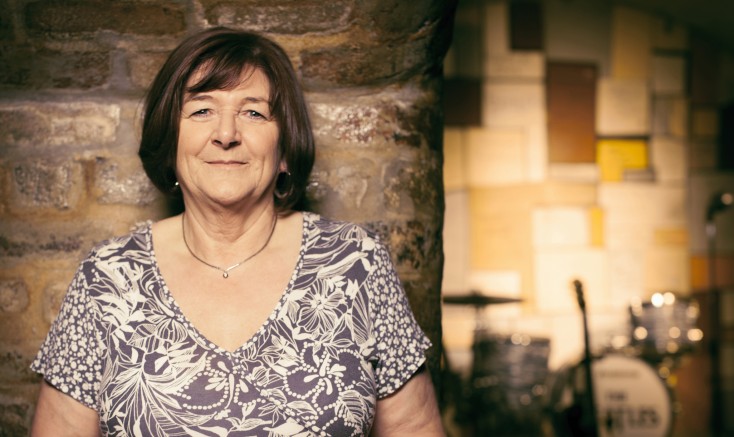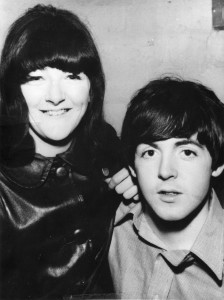By ANGELA DAWSON
Front Row Features
HOLLYWOOD—Talk about your dream job.
Freda Kelly was a teenager living in Liverpool, England in the early 1960s when she landed a job as the Beatles secretary. A fan of the band before they were famous, Kelly answered a call for a secretary from their manager Brian Epstein and discovered that the job was handling administrative duties for the band. A big component of her job was answering fan mail. With fans numbering only in the hundreds at the time, the job seemed simple enough. She even gave out her home address to fans where letters to the band could be sent. As the band’s popularity grew and grew and grew, Kelly stuck with them. She was more than an employee, though. She also served as a confidante and friend to the lads, and was considered part of their family. Ultimately, she ended up working for John Lennon, Paul McCartney, Ringo Starr and George Harrison for 11 years—when the band broke up.
Up until recently, Kelly’s story of her association with the Beatles has been kept a secret. She rejected all previous requests for interviews. But thanks to a new documentary called “Good Ol’ Freda,” the dedicated staffer’s story—and that of her employers of many years—is now being told.
Helmed by L.A. filmmaker Ryan White (“Pelada,” “Perry v. Schwarzenegger”), “Good Ol’ Freda,” provides a glimpse behind the scenes of the Beatles empire as witnessed by an unassuming, loyal employee.
White is a longtime acquaintance of Kelly—his uncle was a member of the Merseybeats, another Liverpool band that came up at the same time as the Beatles—but he was unaware or her incredible story until Kelly and a producer friend approached him a few years ago about telling it. The filmmaker was astounded by what he discovered through a series of conversations with Kelly, and though he was working at the time on another documentary (regarding California’s Proposition 8 same-sex marriage controversy), he found time to make “Good Ol’ Freda.” (On Sept. 6, the documentary is in theaters and available on demand and on iTunes.)
Q: You weren’t alive when the Beatles became a worldwide pop phenomenon? What was your introduction to the Beatles?
White: My uncle is (British musician) Billy Kinsley. He was in the Merseybeats, a contemporary band of the Beatles in Liverpool. They played the Cavern Club with them many times. They were on Brian Epstein’s books. So I’ve grown up with my parents’ generation being fully entrenched in the Liverpool music scene. My aunt and uncle and their whole group of friends are connected to that world. Freda was one of those people. So I grew up around her, very casually. I didn’t know her that well. I knew her from conversations at wedding receptions, birthdays or things like that. I didn’t know she was the Beatles’ secretary. She really is that private. It never came up in our conversations over the decades until four years ago.
Q: Why has Freda decided to tell her story now?
White: She’s reached this age that she thought it might be time to go on the record, and leave this story so it may be a legacy for her family. She knew I was a filmmaker. She had had many offers over the past 40 or 50 years to tell her story in a tell-all book or a film, and she’d declined those. She approached me a few years ago about (making a documentary) because it’s important for her to do it with a team that she feels comfortable with and trusted to do it faithfully to her.
Q: When you know someone personally like that, how do you start the process of filming them? Did you go over with her what you wanted to discuss or did the conversations come about organically?
White: The process began with phone calls. I thought, maybe she had worked for them a year or two. I thought there might have been many secretaries. I had no idea the scope of her story—that she was with them before they were famous and all the way until after they disbanded. She is one of the only survivors from the inner circle and she’s the only one who had never gone on the record, and most importantly, the crucial role she played in the Beatles decade. So it began with phone calls where Freda and I would just chat and she would tell me stories and would remember stories as we were talking. I was floored right away with her storytelling ability. I think it’s a Liverpudlian trait to have a knack for telling a really good story in a cinematic way. Listening to her stories I was sold.
Q: What surprised you most about her?
White: She hadn’t even taken the time to tell these stories to her family members much less ever having written them down or try to structure them in some way. We did work hard before I got there to figure out the overall structure of her story, where things went. I did a ton of research. Even though I grew up around people who were connected to the Beatles, and I was a huge Beatles music fan, I was no Beatles expert by any means on their lives or Beatles history. So I was researching a lot of that and then we went to Liverpool and did a three-week shoot with Freda. We just sat in her living room—a cameraman, a producer and me—and chitchatted on camera from morning until night. I have to say, as a filmmaking, it will always be one of the special experiences of my life, to be a part of that excavation process with someone who really hasn’t tapped the bowels of their memory over the past 40 years. And to see her, literally, remember stories as we’re talking. It was such a fun experience.
Q: How long did you interview her in person?
White: We did a three-day massive interview from morning until night in her living room, where we would only break to eat meals. And then we did a separate shoot where we filmed her at different locations. My producer and I edited a cut about three hours long of her telling stories in the living room is a way that it made sense. That helped me figure out how to illustrate the rest of the story. The next time we went back to Liverpool we were able to get more stories out of Freda, which helped me connect the dots a little bit. That’s when we went to places like Ringo’s childhood home, Liverpool’s town hall and the Empire Theatre. She was telling us the stories and we had to go back and take her to some of these places and I’m so glad we did that, because when we did that, so many more stories came out when she went there. She remembered the dressing room where John Lennon fired her (at one point), is an example. She could remember the stories better when she was in the places. We also interviewed the other people in the film, which I think helps supplement the film’s story because Freda’s so humble. She’s not going to say, “My job was really important.” Instead, she’d say something like, “I was just a secretary.” She’d never say “I’m one of their longest serving employees” or that her loyalty helped create their success. It was important to talk to people who were around at that time to help build up her character, because she would never do that herself.
Q: You have the clip of Ringo at the end speaking about her. Did you try to get Paul on film?
White: Paul and Ringo’s teams have been extremely supportive of us making this film, which makes me an incredibly lucky filmmaker. My film is about Freda Kelly and not about the Beatles, in general, or an album, where it’s a lot tougher road to get those projects to completion. My film is about someone whom everyone had a lot of respect and affection for. That clearly aided us in getting permission to use Beatles music, which is extremely rare, almost unheard of to have Beatles music in a film. So there are a lot of circles involved in approving Beatles music, so we’re happy that they saw the value in contributing that to our film. Paul was unavailable is the honest answer to do an interview. When we were filming the movie, it was the Summer Olympics in London and the Queen’s Jubilee. I was so grateful that Ringo did something (on-camera) for the film. I’m still hopeful we might be able to get Paul to do some kind of DVD extra. But, we’re extremely grateful to both of them for the support they’ve given us throughout the film’s process.






